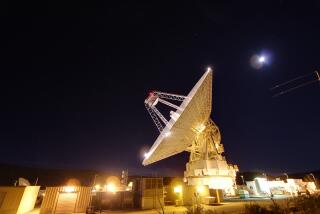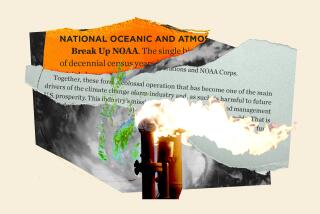The GOP attack on climate change science takes a big step forward
Living down to our worst expectations, the House Committee on Science, Space and Technology voted Thursday to cut deeply into NASA’s budget for Earth science, in a clear swipe at the study of climate change.
The committee’s markup of the NASA authorization bill for fiscal 2016 and 2017 passed on a party-line vote, Republicans in the majority. The action followed what appears to be a deliberate attempt to keep Democrats out of the loop. According to Rep. Eddie Bernice Johnson (D-Texas), the committee’s ranking Democrat, her caucus “did not even know [the markup] existed before last Friday. ... After we saw the bill, we understood why.”
As outlined by Marcia Smith at SpacePolicyOnline, the measure would cut NASA’s Earth science budget to at most $1.45 billion in fiscal 2016, from $1.77 billion currently -- a cut of $323 million, or nearly 20%. Under some circumstances, the budget could shrink even further to $1.2 billion, a cut of nearly one-third. Compared with President Obama’s request for fiscal 2016, which is $1.95 billion, the proposal would amount to a cut of at least 26%.
The budget plan perfectly reflects the House GOP’s glorification of space exploration, which masks its disdain for research on climate change. Unsurprisingly, it has created consternation among experts. The American Geophysical Union observed just before the vote that NASA’s Earth science programs involve more than the study of climate change as such, but “provide a basis for knowledge and understanding of natural hazards, weather forecasting, air quality, and water availability.”
The Earth Science division, the organization continued, helped monitor the movement of oil into Gulf of Mexico coastal waters after the 2010 Deepwater Horizon explosion, track severe storms and tornadoes, and assisted with flood predictions and earthquake response.
“It’s hard to believe,” Johnson wrote Wednesday in an op-ed article in The Hill, “that in order to serve an ideological agenda, the majority is willing to slash the science that helps us have a better understanding of our planet.”
The announcement of the vote by committee Chairman Lamar Smith (R-Texas), was a model of misdirection and deceit. It mentioned “space” and “space exploration” a couple of dozen times, (not including the names of space-oriented organizations or his own committee). Earth science got one mention, and that one was an undisguised political slam: “The Obama administration has consistently cut funding for ... human space exploration programs, while increasing funding for the Earth Science Division by more than 63 percent.”
Smith indicated he was particularly gratified by the support of the Planetary Society, which is headed by the science education promoter Bill Nye and earlier sent out a letter thanking the committee for supporting a “scientifically ambitious, affordable plan of solar system exploration.”
The Planetary Society blundered in letting itself be exploited in this way. Its actual position on the bill is negative, precisely because of “the cuts to Earth Science,” as Casey Dreier, the organization’s director of advocacy, wrote just before the committee vote, saying that “the Planetary Society cannot support the full bill as written.”
Its response shows what bad things can happen when science advocacy groups take too narrow an approach to their responsibility to lobby for more than their narrowest interests -- all science suffers.
President Obama took a well-deserved shot at climate change deniers in the Senate during last weekend’s White House Correspondents’ Assn. Dinner. Under the shelter of a comedy turn with his White House “anger translator Luther” (Keegan-Michael Key), he started to rant, “Miami floods on a sunny day, and instead of doing anything about it we’ve got elected officials throwing snowballs in the Senate [James Inhofe, we’re looking at you].
“What kind of stupid, shortsighted, irresponsible b--,” Obama said.
What kind, indeed? This kind.
Keep up to date with the Economy Hub. Follow @hiltzikm on Twitter, see our Facebook page, or email [email protected]
More to Read
Inside the business of entertainment
The Wide Shot brings you news, analysis and insights on everything from streaming wars to production — and what it all means for the future.
You may occasionally receive promotional content from the Los Angeles Times.











